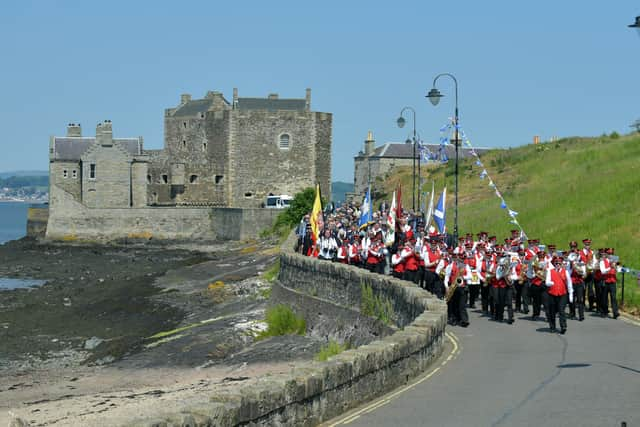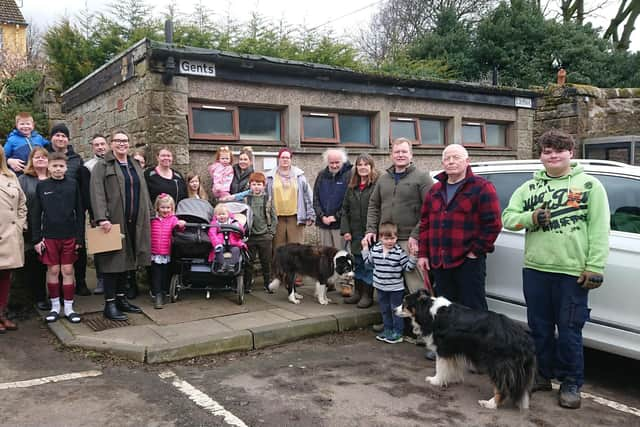Falkirk Council: Closing public toilets near Outlander featured Blackness Castle will damage tourism strategy
Blackness Castle – which doubles as Fort William in the hit television series Outlander – is one of Falkirk Council’s top tourist draws, with thousands of visitors every year.
The dramatic 15th century fortress, which sits beside the village of Blackness on the Firth of Forth, joins the Kelpies and the Falkirk Wheel as tourism ‘heroes’ that are major draws for the district, according to a newly approved tourism strategy.
Advertisement
Hide AdAdvertisement
Hide AdBut while Falkirk Council’s executive approved the new strategy on Tuesday, councillors Robert Spears and Siobhan Paterson criticised the council’s recent decision to close the village’s public toilets, unless they are taken on through a community asset transfer.


Councillor Paterson, who represents the Upper Braes, said: “Public toilets are such a basic requirement and Blackness is a great case in point. If we want to encourage people to these locations we need to have the bare minimum in place if we want them to stay longer than 30 minutes.”
She also said she was concerned that the lack of public transport in the district would affect tourism, and also risk leaving Upper Braes residents “unsupported and potentially isolated”.
But there was optimism that promoting Falkirk’s undoubted tourist attractions, including its award-winning path network and green spaces, will bring economic benefits, including jobs, to the area. Members heard that while the tourism industry was badly hit by the Covid pandemic, it still brought in £85 million from 600,000 visits to the Falkirk area in 2021.
The new strategy suggests various ways in which targeted marketing and promotion will encourage visitors to spend more time and money locally.


Head of growth and planning, Michael McGuinness, said: “We have amazing assets across the Falkirk area. We want to make sure we take advantage of those assets and better connect up those assets with joint ticketing opportunities and make sure we make use of our amazing green spaces.”
‘Visit Falkirk’ promotional material will also be given a new look to modernise the brand. They hope it will help return the area to levels seen in 2019, when research showed that £137 million had been generated by 949,000 visits.
The years before the pandemic had seen unprecedented growth for tourism in the Falkirk area and SNP Councillor Gary Bouse said there were tremendous opportunities ahead. He said: “We’ve spoken about the Kelpies and the Falkirk Wheel but Falkirk has got so much more, with Callendar House, the Antonine Wall, the Pineapple and two new distilleries opening up.”
Advertisement
Hide AdAdvertisement
Hide AdHe also highlighted the area’s industrial history, including the Carron Iron Works, which played a crucial part in the Industrial Revolution. “There are great opportunities here in this area. The history in Falkirk goes back beyond Roman times,” he said.
A key part of the strategy is targeting the right markets – in particular reaching more English visitors. There is also an acknowledgement that the area needs a wider range of good quality accommodation if it hopes to increase overnight stays.
Mr McGuinness told councillors they plan to engage the hotels themselves as “there are opportunities there to improve that particular market”.
Conservative councillor James Bundy said he was keen to see the area’s unique history being tapped into as well as its Scots heritage. He also suggested that the Jacobite Battle of Falkirk should be better promoted. He said: “We have a Jacobite battle in our own back yard but it’s very hard to know that it happened, so we should be all over that. Can we learn the lessons of the Royal Mile, for example, and have more tartan, more bagpipes? Can we have that on our High Street so that people are coming not only for retail but also for a Scottish experience that is unique to the area?”
He also called for the canal paths to be lit up 24/7 to make it “an asset people want to use”.
Councillor Cecil Meiklejohn reminded councillors that another new project in the pipeline is the £3 million art park, which is being funded by Falkirk Growth Deal. It will use public art to link the canal path between the Falkirk Wheel and the Kelpies, while the canal will also see major investment when Scottish Canals relocates its headquarters to Lock 16.